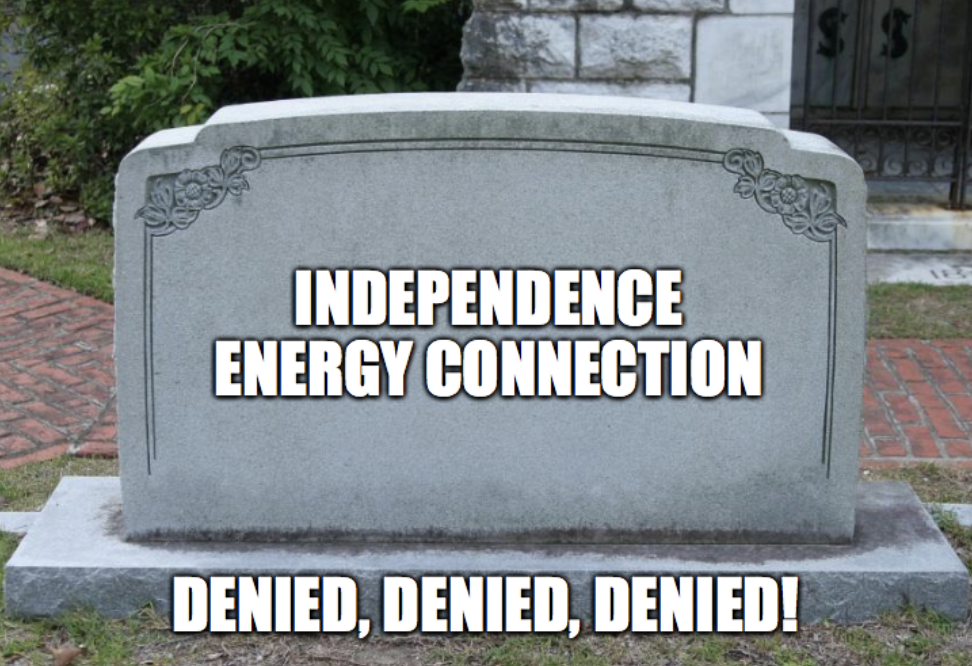However, in a letter to the Maryland Public Service Commission, Transource says that after being denied a permit by Pennsylvania it will seek appropriate judicial and regulatory relief at the federal level.
Appropriate? There's no appropriate judicial or regulatory relief at the federal level. Transource must be dreaming!
Here's Transource's scheme, in a nutshell...
Transmission planning is a federal affair carried out by regional transmission organizations (PJM) under the supervision of the Federal Energy Regulatory Commission. Transource thinks that because PJM found the Independence Energy Connection to be "needed" that prevents Pennsylvania from carrying out its own evaluation of need under the state statute. Transource purports that Pennsylvania must accept PJM's findings of "need" and therefore must issue a state permit.
Sorry, Transource, that just doesn't work! Good luck finding a federal court that will even accept jurisdiction of such a crazy contention. Even FERC can't help you in the regulatory realm. FERC does not have authority to issue transmission permits except in certain rare situations for which Transource doesn't qualify.
I think the Pennsylvania PUC was quite clear in its Order.
We expressly reject any argument that the authority granted by the Pennsylvania Legislature to this Commission under the Code, including the power to apply Commission Regulations in the present circumstances, is preempted by the federal power pursuant to which PJM conducts its selection process for regional transmission planning purposes, including Project 9A. To the extent Transource argues that this Commission is prohibited from rendering an independent determination of “need” for Project 9A, which may find that the weight of the evidence does not support a determination of “need” for the proposed project, pursuant to 52 Pa. Code § 57.76(a)(1), despite PJM’s selection of the project for regional planning purposes, we disagree.
Contrary to Transource’s asserted position, the federal authority under which PJM operates does not extend beyond PJM’s approval process, where approval is sought from a state commission. PJM approval for a project, including Project 9A, does not guarantee approval for siting and construction of transmission lines within the borders of the sovereign Commonwealth of Pennsylvania
FERC likewise recognizes this limitation stating the following as part of Order No. 1000:
We acknowledge that there is longstanding state authority over certain matters that are relevant to transmission planning and expansion, such as matters relevant to siting, permitting, and construction. However, nothing in this Final Rule involves an exercise of siting, permitting, and construction authority. The transmission planning and cost allocation requirements of this Final Rule, like those of Order No. 890, are associated with the processes used to identify and evaluate transmission system needs and potential solutions to those needs. In establishing these reforms, the Commission is simply requiring that certain processes be instituted. This in no way involves an exercise of authority over those specific substantive matters traditionally reserved to the states, including integrated resource planning, or authority over such transmission facilities. For this reason, we see no reason why this Final Rule should create conflicts between state and federal requirements.
The D.C. Court of appeals summarized Order No. 1000, as follows:
In Order No. 1000, the Commission expressly “decline[d] to impose obligations to build or mandatory processes to obtain commitments to construct transmission facilities in the regional transmission plan.” More generally, the Commission disavowed that it was purporting to “determine what needs to be built, where it needs to be built, and who needs to build it.” As the Commission explained on rehearing, “Order No. 1000’s transmission planning reforms are concerned with process” and “are not intended to dictate substantive outcomes.” The substance of a regional transmission plan and any subsequent formation of agreements to construct or operate regional transmission facilities remain within the discretion of the decision-makers in each planning region.
Is this just a delaying tactic that keeps the lawyer cash register running? Cha-ching $$$ Cha-ching!
IEC is dead. Put it out of its misery. Don't make yourself into the laughing stock of the transmission world. Quit wasting my money, AEP!

 RSS Feed
RSS Feed